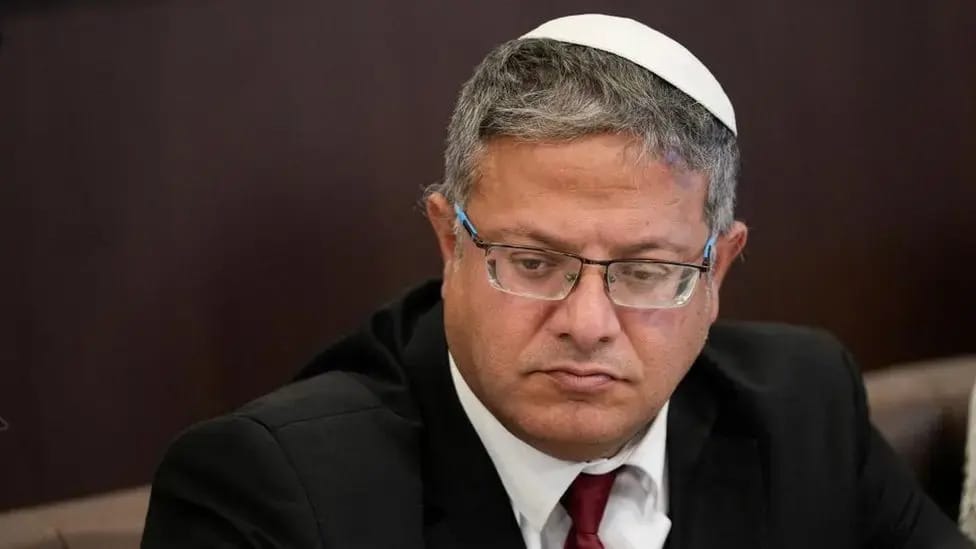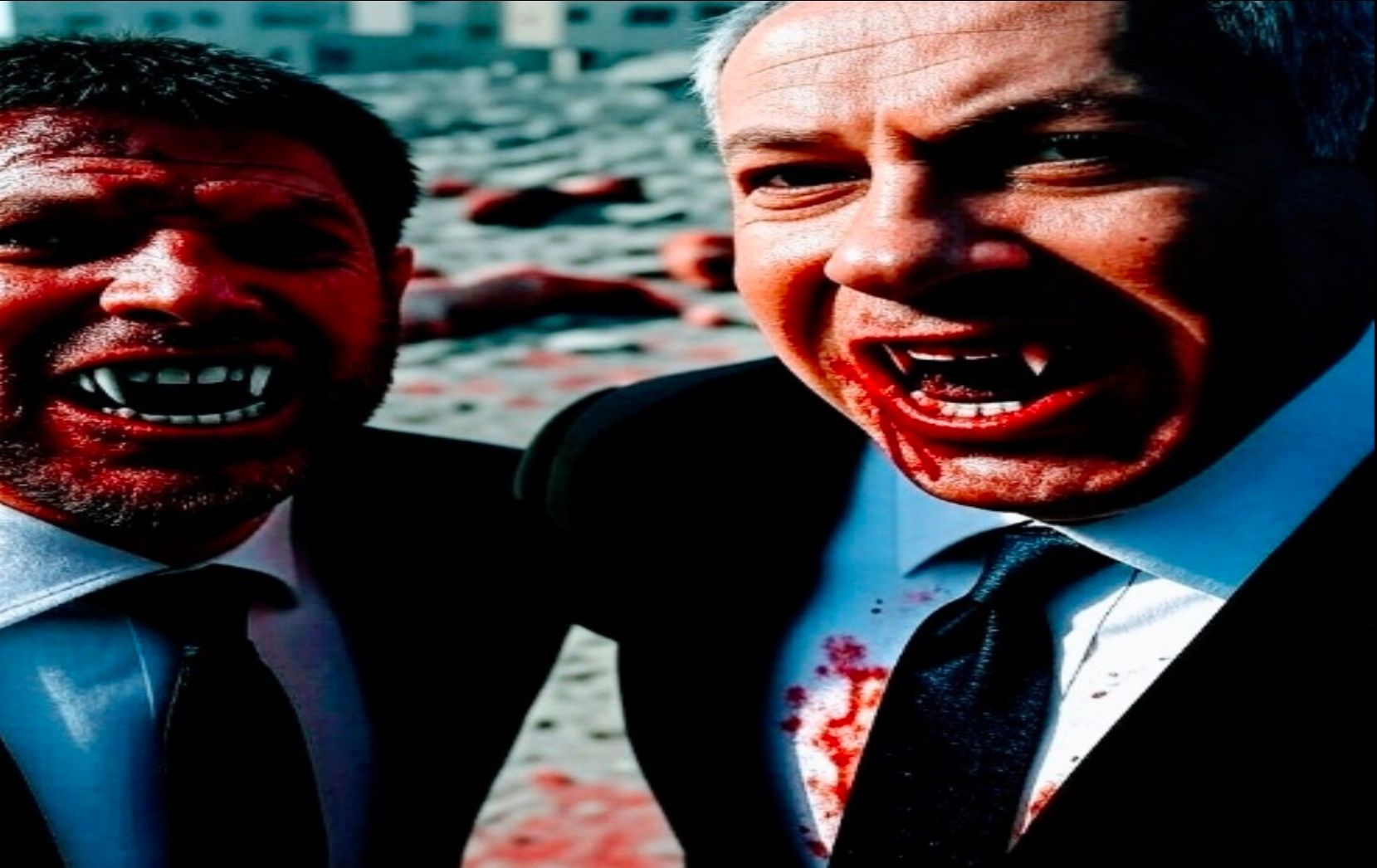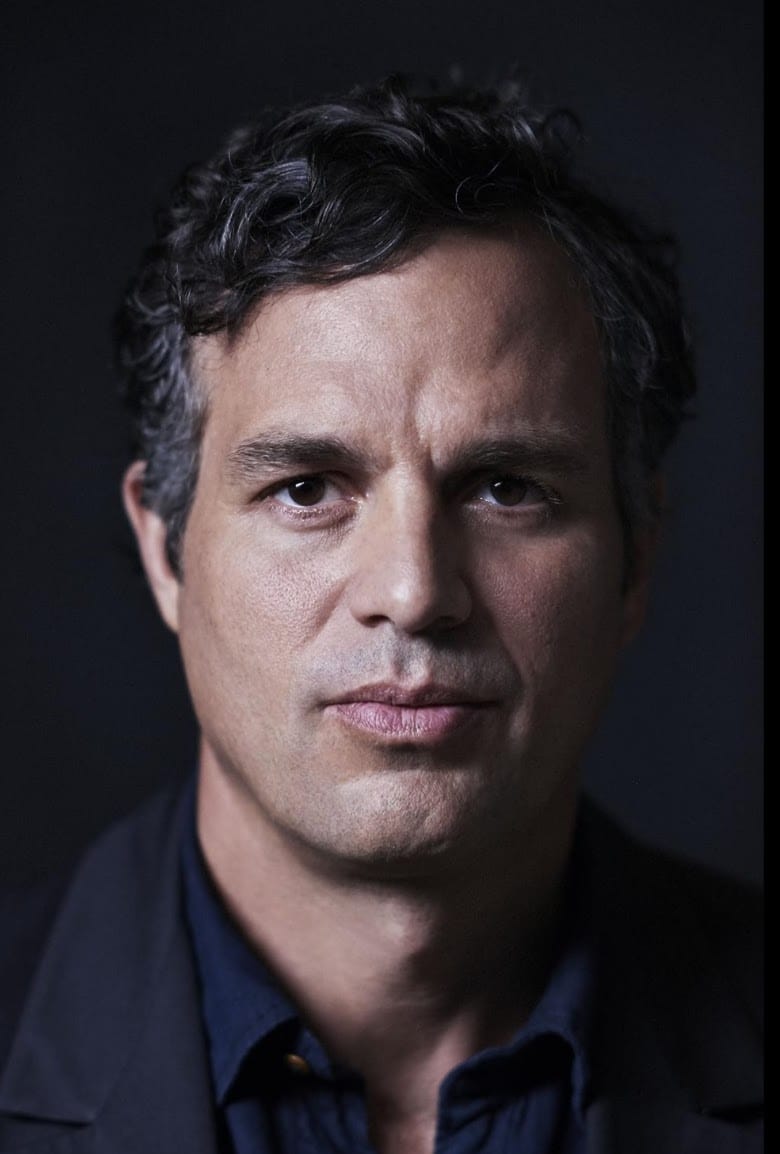Now that a characteristically one-sided Zionist ceasefire is in place – “you cease, we fire!” – it’s a good time to calmly analyse the goals of Benjamin Netanyahu following the Al-Aqsa Flood Operation of 7th October 2023, and whether the Zionist leader has achieved said goals to date.
Because he is known as one of history’s greatest liars, and perhaps the greatest of all liars currently breathing, we will examine ignoring most of his words and instead analysing his actions. A man who speaks peacefully to the Western world in English, and speaks of violence and genocide to his Hebrew audience, the phrase “fork-tongued” has never been so apt as it is for the Polish man born as “Benjamin Mileikowsky,” later to adopt the name “Netanyahu” in order to appear Middle Eastern. This analysis will do what nobody else has managed so far. We will state his REAL goals and will analyse those rather than his treacherous words.
WHAT WERE THE REAL GOALS?
1. “Kill all the hostages.”
Although he publicly stated that he wanted to “rescue all the hostages,” what most of the Western media, and even much of the resistance media has missed, is this: Benjamin Netanyahu had NO INTENTION of freeing all the hostages as living Jewish hostages were critical bargaining chips in the hands of Hamas negotiators. In a casino, in a deadly game of poker, worth thousands of dollars, the man with the best hand walks out with the cash so Netanyahu, in a geopolitical game of prisoners, set about burning the cards which would give Qassam Brigades the upper hand in any deal. He aimed at the wrist and fired with his Magnum 45.
The military wing of Hamas, the Al-Qassam Brigades, offered many sensible paths out of the crisis following their unprecedented military operation against the Gaza division of the IDF on the morning of October 7th 2023. 1200 Israelis were killed, over a thousand were injured and over two hundred prisoners of war were captured by The Resistance. But in the days following the historic assault, within seven days of the Al-Aqsa Flood, according to many credible sources, the Hamas leadership in Doha reached out and offered to release all “Israeli civilians” in exchange for the Palestinian women and children being held against their will in Zionist dungeons. There were, at the time, roughly 900 Palestinian women and 300 Palestinian children in Israeli prisons. The offer was immediately rejected by Netanyahu.
The Israeli Prime Minister, rather than trying to bring back Jewish military personnel whose lives were now on a knife-edge, saw Al-Aqsa Flood as a golden opportunity to seize Gaza, to make it a part of “The Greater Israel,” a dream of his since he was a young man. When he rebuffed the very reasonable Hamas offer, made in Doha to Qatari intermediaries, the Islamic resistance returned in November and made it clear to the Zionist leadership, through intermediaries again, that they were happy to go even further and offer the now-famous “all of all” deal. The Hamas leader in Gaza, Yahya Sinwar, was happy to go along with a deal of this nature and spare the people of Gaza, not to mention the Israeli public, and the Zionist prisoners, months and months of blood and death.
In short, they would release ALL Zionist prisoners of war, regardless of military rank, for the 10,000+ Palestinian prisoners, many of whom had been languishing in Israeli dungeons for years, often without charge or real legal representations. Many were in prison after being “convicted” in Israeli military courts where the “judge” was a senior member of the Israeli Defence Forces. But, because this “all for all” deal would have represented the greatest achievement in the history of Hamas, formed in 1988, and because a prisoner exchange would have ended the war immediately, it was not welcomed by the Likud coalition government in Tel Aviv. In addition, if Qassam Brigades had brought back every Palestinian prisoner – man, woman and child - this would have represented one of the most embarrassing moments in the history of Zionism. The inevitable PR value for Hamas, broadcast across the world as victors and liberators, would have been huge and they would have immediately been seen as heroes across the Arab and Islamic World. Knowing this all too well, Netanyahu again rejected this in favour of invasion and carpet bombing of Gaza which has resulted in the current ongoing genocide of the Palestinian people. The current death toll stands at over 70,000 Gazans dead including at least 25,000 children.
So, in short, Netanyahu wanted to DEVALUE the captured Israeli Jew, in the great game of Arab-Israeli poker, by saying to Hamas: “You are capturing Jews so you can exchange them for Palestinians, right? Ok, so now, I am going to use ‘The Hannibal Directive’ to kill those Jews myself as you capture them. This way, I will weaken your bargaining position. Them I will carpet bomb the Strip. There will be no more exchange deals like Shalit in 2011, where you got a thousand Palestinians for only one Jew!”
The IDF killed dozens of hostages on 7th October using helicopter gunships[i] and have carpet-bombed Gaza so wildly since that the deaths of dozens Zionist hostages were inevitable. If an army drops 45,000 bombs on a strip of land which is only 41 km long and 12 km wide, almost everybody in that area will be hit or at least affected.
So, if we are honest, Netanyahu has succeeded in this goal. Both Hamas and Hezbollah now know that if they capture Israelis, there will be no negotiation. Only genocide.
GOAL:

2. “We will destroy Khamas!”
“Bibi” Netanyahu hoped that the IDF campaign would dismantle Hamas’s rocket infrastructure, tunnel networks, command centres, and fighters. He said this both in English and Hebrew on several occasions. While it is true that Israel has inflicted heavy damage on Gaza, killed many militants, and destroyed large portions of Gaza’s infrastructure, it is clear that Hamas is nowhere near defeated. Independent studies, photos and social media posts clearly show the enormous destruction which has been caused by Zionist pilots over the last two years.
But disabling Hamas entirely is more elusive. Analysts admit that despite the heavy blows, and despite the assassination of famous leaders like Yahya Sinwar and Mohammed Deif, Hamas has retained the canny capacity to resist, quickly reorganise and restructure, and remain politically relevant. This has been shown, more recently, by the fact that President Donald Trumps’ Special Envoy, Steve Witkoff, has, a number of times now, spoken directly to the Hamas leadership, which has given them a degree of legitimacy previously unseen in Washington. Historically, no American officials would speak to Hamas directly under the guise of “we don’t negotiate with terrorists.” Yet, under the leadership of Trump, American officials have sat in the same room as Hamas and spoken face-to-face rather than through Qatari and Turkish intermediaries, as has usually been the historic norm.
In short, Israel has degraded but not neutralised Hamas’s ability to threaten — especially over time. The war’s continuation attests to that. According to even the Israeli press, Hamas’ military wing had 20,000 members in 2023 and have approximately 18,000 fighters today. This shows they are well and truly, alive and kicking. The fact that hundreds of Zionist occupation forces have been killed and over 10,000 have been injured[ii], many blinded or permanently paralyzed, tells us that Al-Qassam Brigades are not just operational. Rather, the military wing of Hamas is operating and carrying out high quality resistance operations which are causing untold damage to the much better equipped Israeli Defence Force. When we consider that the IDF are financed and armed by the United States, the UK, France, Germany and the entire Western Alliance, it is an incredible achievement for Hamas that they have survived such an intimidating set of opponents.
GOAL:

3. Remove all Palestinians from Gaza and “resettle” Gaza.
Since the major escalation in the Gaza Strip the notion that Israel might seek to relocate the Palestinian Arab population of Gaza into neighbouring territory, particularly the Sinai Peninsula or broader parts of Egypt, has recurred.
“Ideas like settling in Gaza are welcome … I also want to encourage emigration [of Palestinians from Gaza] … I am working hard to promote the encouragement of migration from Gaza with the prime minister.”
Itamar Ben‑Gvir (National Security Minister)

A document produced by Israel’s intelligence ministry is reported to contemplate moving Gaza’s roughly 2.3 million people into Egypt’s Sinai in order to free the Strip for a longer‑term Israeli administrative or security role. While this remains described as a conceptual paper rather than an official government policy the mere suggestion has triggered regional alarm.
From the Egyptian side President Abdel Fattah el‑Sisi has publicly and emphatically rejected such a plan. Egypt has said it will not allow the forced displacement of Palestinians from Gaza into its territory and that it regards any such scheme as unacceptable in historic and political terms. President Sisi has warned that the Egyptian people would protest in large numbers should such a transfer be attempted. Cairo’s objections rest on multiple grounds: the violation of international humanitarian law by forced transfer, the undermining of Palestinian rights including return and self‑determination, and the national security risks of absorbing a large displaced population in a region already burdened by instability.
Parallel to these public rejections are widespread reports that Israel and its allies have floated financial incentives to Egypt in order to secure cooperation. Among the incentives discussed (though not officially confirmed by either side) is the possibility of relief or favourable treatment of Egypt’s burdensome debt.
While there is no verified evidence that such a quid pro quo has been struck the idea reflects how economic leverage might be used in diplomacy. On a related note, the IMF has underwritten significant financial support to Egypt via an Extended Fund Facility under which Egypt secured a large loan programme and, in some measures, benefit from reductions in borrowing costs. For example, the IMF’s creditor terms for Egypt have been adjusted to save the country around US$190 million a year in debt costs. This shows how Egypt’s economic vulnerability and need for external financing may expose it to geopolitical bargaining even if no formal deal has been publicly acknowledged. But the notion of a giant bribe to Egypt to take the Palestinians in has certainly been discussed by leaders in Tel Aviv, Washington and London. A write off
In effect, the clash between Israel’s conceptual relocation strategy and Egypt’s categorical refusal reflects deeper structural problems. On one side Israel seems to view the relocation option as a strategic answer to the Gaza challenge by reducing the Palestinian population there and establishing new governance arrangements. On the other side Egypt sees the plan as a threat to its sovereignty border stability and regional standing as a supporter of the Palestinian cause. President Sisi’s outright rejection therefore sets a clear red line and forces any durable solution for Gaza to engage with the rights and status of the Palestinian population within the Strip rather than relying on an external resettlement fix.
Moreover, the role of financial incentives — debt relief or favourable IMF‑linked financing — underscores how economic and geopolitical objectives are entangled. Egypt’s large external debt and dependence on reform‑linked funding from the IMF render it sensitive to transactional appeals even if public discourse insists only principal matters. However, the available documentation from the IMF “officially” states that Egypt’s financing programme is unrelated to developments in Gaza and that the Fund does not tie its support to refugee absorption or relocation. But knowing the influence that Washington has over the IMF, such a deal would certainly be welcomed by the Israeli leadership, in particular the right-wing lunatics: Bezalel Smotrich and Itamar Ben‑Gvir, the two most racist members of the Netanyahu government.
Anybody who knows how Zionists think will tell you: if the Israeli leadership could give Egypt $20 billion to take in two million Gazans, they would certainly pay this money.
GOAL:


According to the BMK, over 100,000 Palestinians have been killed in the last two years.
4. “Decapitate Hezbollah.”
The Iranian-backed militia Hezbollah, formed in the South of Lebanon in the early 1980s, had inflicted two historic defeats on Israel in 2000 and 2006: two of the biggest humiliations inflicted upon the Zionist entity since its creation in 1948. Since then, the Israeli hierarchy, licking their wounds, had made it a goal to prepare the ground and to “shape the battlefield” in such a way whereby the next clash with Hezbollah would result in the Lebanese group suffering losses which had never previously experienced.
While talk of destroying Hezbollah seemed unrealistic through the 2000s and 2010s, the 7th October Al-Aqsa Flood Operation against Israel forced Hezbollah to, suddenly and unexpectedly, make a choice: leave Hamas to it or join in. They chose the second option but operated within certain parameters, what the Hezbollah leadership called “the rules of engagement.” They though, a little naively, that they had an unspoken “understanding” with the Israelis that they would not strike Israeli cities with drones and missiles and the IDF, in return, would not attack the Lebanese capital, Beirut.
The first few weeks after The Al-Aqsa Flood Operation saw Hezbollah, in a relatively controlled style, attacking Israeli tech with anti-tank missiles thus taking out critical watchtowers and electronic surveillance devices rather than killing Israeli soldiers by the dozens, something the group has always claimed to be able to do with ease. This, the Hezbollah leader Hassan Nasrallah deduced, would show the Palestinians that he is ready to support them to the bitter end but would not cause so much damage to the IDF that Netanyahu would be compelled to launch a carpet-bombing campaign in Lebanon similar to the one in Gaza. Threats from Yoav Gallant, the Israeli Minister of Defence, that he would bomb Lebanon “back into the Stone Age” were not being taken lightly, and rightly so.
It was a difficult sell, a geopolitical tightrope that few could pull off, but Nasrallah, one of the most charismatic leaders in the region, had defeated Israel twice previously. But what happened over the next months took Nasrallah by surprise and tore the so-called “rules of engagement” to shreds. All of his equations collapsed and the Zionist revenge against Hezbollah for 2000 and 2006 was in full force.
Between 2023 and 2024, Israel executed a series of targeted strikes aimed at dismantling Hezbollah's leadership, a strategy known as "decapitation." Using booby-trapped pagers and walkie talkies, Mossad (the external Israeli intelligence agency) exploded these compromised devices remotely and killed and injured hundreds of Hezbollah members. Knowing their communications networks were compromised, this forced Hezbollah leaders and decision makers to meet in person more than they were comfortable with. These gatherings were then identified and targeted, even though some of these meetings were taking place deep underground.
The Zionist approach sought to disrupt the group's command structure and diminish its operational capabilities. In July 2024, Israel targeted and killed Fuad Shukr, Hezbollah's senior military commander, in an airstrike on Haret Hreik, a Hezbollah stronghold in Beirut. This operation resulted in the deaths of Shukr and several others, including civilians.[iii]
On 27th September, 2024, Israeli forces assassinated Nasrallah during an airstrike on the group's headquarters in Dahieh, Beirut.[iv] His death marked a significant blow to Hezbollah's leadership. Subsequent strikes targeted other senior figures, including Hashem Safieddine, the head of Hezbollah's Intelligence Branch, and Ibrahim Aqil, the commander of the Radwan Force, Hezbollah's elite special operations unit.[v] These operations effectively decapitated the group's top command.
The cumulative effect of these targeted killings severely disrupted Hezbollah's leadership and operational cohesion. In response, Hezbollah appointed Naim Qassem as the new Secretary General. However, analysts suggest that Qassem's leadership may lack the influence and charisma of his predecessors, potentially leading to internal challenges within the organization.
Despite these setbacks, Hezbollah remains a formidable force in terms of the arsenal it possesses. It is still believed to have thousands of missiles and hundreds of sophisticated armed drones. But the Israeli strategy of decapitation has forced the militia to take a step back and acting with restraint, Hezbollah fighters are not currently in direct conflict with the Zionist occupation forces.
Hezbollah is not dead but is certainly on life support.
GOAL:

5. “Win the PR war!”
Since 7 October 2023, when Hamas launched a large assault on southern Israel, the Israeli government has pursued its stated military and political goals in Gaza. Netanyahu and thousands of paid Hasbara operatives across the world, people who answer to the infamous intelligence department, the Israeli Unit 8200, have tried to put lipstick on a pig.
They have tried to make murder look like self-defence.
They have tried to make black look like white.
They have tried to make a genocide of women and children look like an asymmetric war.
But despite the efforts of high-profile Zionists like Jordan Peterson and Ben Shapiro, it is quite clear that world public opinion has shifted significantly. In Arab and Muslim countries, outrage at the devastation in Gaza remains nearly universal. In much of Europe and North America, street protests and student demonstrations have expressed growing solidarity with Palestinians. Western governments have found themselves under domestic pressure to call for ceasefires and restrictions on arms sales as images of dead children are splashes all across social media, as the people of the world turn to the internet rather than the TV for their daily news feed.
Since 7th October 2023, Israel has faced a series of major public relations disasters that have damaged its global image and weakened diplomatic support. The story of “40 beheaded babies” and “babies in ovens” were quickly dismantled by journalists such as the American writer, Max Blumenthal, and the Jordanian author, Ali Abunimah.[vi]
Daniel Hagari famously pointed at a “terrorist” timetable only to find that this was an Arabic calendar in a hospital ward.[vii] The Israeli spokesman had previously said that the Al Jazeera journalist, Shireen Abu Akleh, had been killed by Palestinian militants only to later admit that this had been a killing carried out by Israeli occupation forces.[viii]
The initial sympathy Israel received after the Hamas attacks quickly eroded as the military campaign in Gaza escalated. Images of destroyed neighbourhoods, mass displacement, and rising civilian deaths dominated international media. Accusations of disproportionate force and collective punishment became central to global discussion, overshadowing Israel’s ridiculous claim of “only targeting Hamas.”
The most damaging moments came when strikes hit hospitals, schools, and refugee camps. Although Israel often claimed militants were operating nearby, the scenes of civilian suffering circulated widely online and were amplified by humanitarian agencies. The siege on Gaza, restricting water, fuel, and food, was another communications failure that many interpreted as deliberate starvation, despite Israel’s attempts to frame it as security necessity.
Diplomatically, Israel struggled to counter criticism at the United Nations and from traditional allies. Western governments faced domestic protests demanding an end to military support. Social media proved especially hostile, with videos and testimonies from Gaza spreading faster than official explanations. Efforts to label all criticism as antisemitism further alienated many potential supporters. High-profile figures such as Mark Ruffalo and Dan Bilzerian, and several other celebrities publicly condemned Israel’s actions, while even sympathetic commentators called for restraint. Here are some quotes from famous people about their contempt for Israeli crimes against the people of Palestine.
“What we are witnessing in Gaza is not just a tragedy, it is a crime against humanity. Forced starvation, a man-made famine, children and families wasting away while the world looks on in silence. This is not a natural disaster.”

Mark Ruffalo (actor), social media post, 2025
“I cannot work with somebody that justifies or supports the genocide. That is as simple as that.”

Javier Bardem (actor), Emmys red carpet interview, 2025
“It is about the land and the extermination of the Palestinian people. Sick.”

Marcia Cross (actor), Instagram post, 2024
“It (Hamas resistance) does not justify the innocent lives lost in bombing a civilian population in Gaza.”

Angelina Jolie (actor), public statement, late 2023
“Israel is a parasitic organism living off America while providing us zero benefit. We are funding their war crimes and they’ve compromised our government.”

Dan Bilzerian
Overall, Israel’s public relations setbacks stemmed from the visible humanitarian crisis, perceived lack of accountability, and an inability to present a credible long-term political or moral justification for its conduct in Gaza.
In Western Europe, support for Israel has plummeted dramatically in the last two years. Less than 20% of people believe “Israel was right to enter Gaza with its army.”[ix]
The fact that these surveys have been carried out in England, France and Germany, where Israeli has traditionally been seen as part of so-called Judaeo-Christian civilisation, is especially alarming for the Zionist leadership who have poured billions and billions of dollars into protecting the image of the IDF as the “world’s most moral army.”
Using his now world-famous humour, Egyptian comic Bassem Yousef argued that calling Israeli the world’s most moral army is like “calling Jeffrey Dahmer the world’s most vegetarian serial killer.” Stars like Yousef, and the above-mentioned Ruffalo, Bilzerian, the famous Hadid family, and others like Emma Watson, with hundreds of millions of combined followers on social media, have skilfully turned the tables on international Hasbara and exposed the IDF for what it is: the world’s most brutal, murderous and racist army.[x]
GOAL:

Enjoyed this free article? Click below to upgrade and receive 8-12 educational Islamic articles a month
[i] https://www.haaretz.com/israel-news/2024-07-07/ty-article-magazine/.premium/idf-ordered-hannibal-directive-on-october-7-to-prevent-hamas-taking-soldiers-captive/00000190-89a2-d776-a3b1-fdbe45520000
[ii] https://www.aa.com.tr/en/middle-east/at-least-10-000-israeli-soldiers-killed-injured-in-gaza-war-report/3294737
[iii] https://www.aljazeera.com/news/2024/7/31/hezbollahsays-top-commander-fuad-shukr-killed-in-israel-strike-on-beirut
[iv] https://www.theguardian.com/world/2024/sep/30/deep-intelligence-penetration-enabled-israel-to-kill-hassan-nasrallah
[v] https://www.aljazeera.com/news/2024/9/20/who-is-ibrahim-aqil-the-hezbollah-commander-targeted-by-israel
[vi] https://electronicintifada.net/blogs/asa-winstanley/israeli-source-executed-children-lie-admits-story-was-untrue
[vii] https://electronicintifada.net/blogs/ali-abunimah/need-comic-relief-watch-israels-pr-stunt-collapse
[viii] https://www.palestinechronicle.com/the-three-top-lies-of-former-israeli-army-spokesman-daniel-hagari/

